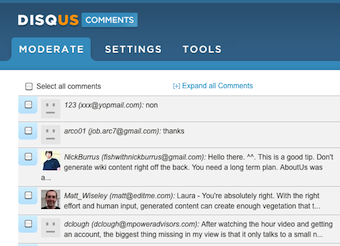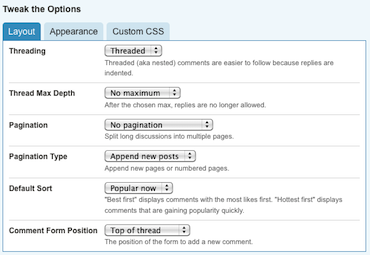 EditMe provides the ability for users to comment on pages, creating a list of comment beneath the content of any given page. In your site settings, you can control whether to let anonymous visitors leave comments or require registration and login.
EditMe provides the ability for users to comment on pages, creating a list of comment beneath the content of any given page. In your site settings, you can control whether to let anonymous visitors leave comments or require registration and login.
If you're using EditMe as a blog and invite public commentary, you might consider Disqus integration. Disqus is a centralized commenting service that provides several benefits over a single-site commenting system.
Most importantly, users can register once at Disqus and will automatically be registered and authenticated to comment on any blog using Disqus comments. The login mechanism encourages commentary as it allows one-click login for anyone with a Facebook, Twitter, Yahoo or OpenID account. Commenters can see the comments they've left on all Disqus blogs over time, and can manage a profile image at the Disqus site that will be shown on any Disqus blog they've commented on.
When a Disqus user comments, the number of comments they've left on all Disqus sites is displayed, along with "likes" and "points" popularity measurements. This kind of scoring mechanism encourages people to leave comments, so a Disqus user is much more likely to comment on your site if they see they're already logged in to leave a Disqus comment.
In addition to increasing the likelihood of comments on your site, Disqus provides a web-based tool where you can centrally manage all the comments on your site, either chronologically or grouped by page. The system is quite configurable, supporting such advanced commenting features as :
:
Installing Disqus in EditMe is simple. Just register at Disqus.com, setup your desired configuration, and then look for the embed code provided. Drop the embed code into a plain-text page on your EditMe site called Disqus (or whatever you prefer). Add a Disqus
comment to any page of your site with a simple [[include:Disquss]] at the bottom.
If you want to entirely replace EditMe's built-in commenting mechanism with Disqus, this can be done with some Layout manipulation. Simply replace the block of Layout code that displayed EditMe comments with this:
<ss editme="if page.canComment && !page.commentsDisabled ;; include 'Disqus'" />
EditMe support can also help you with this, if needed.
There are some drawbacks to using Disqus comments on your EditMe site:
Give Disqus a try below and leave a comment on this post!